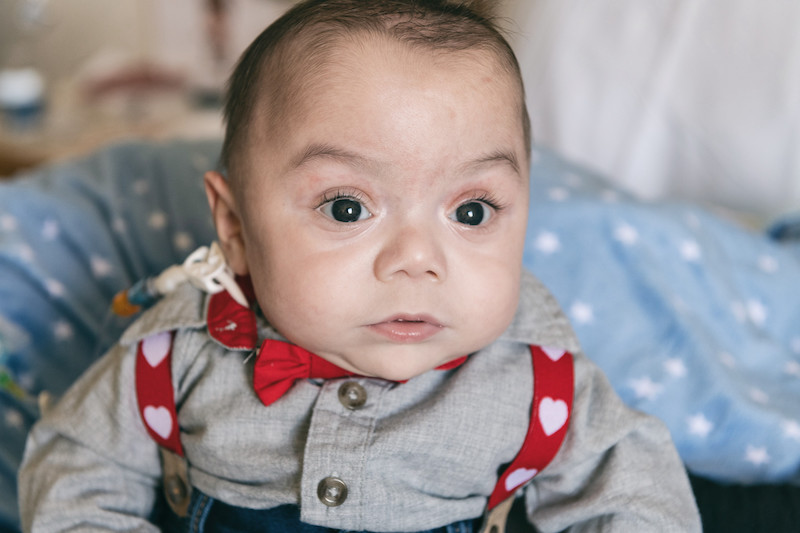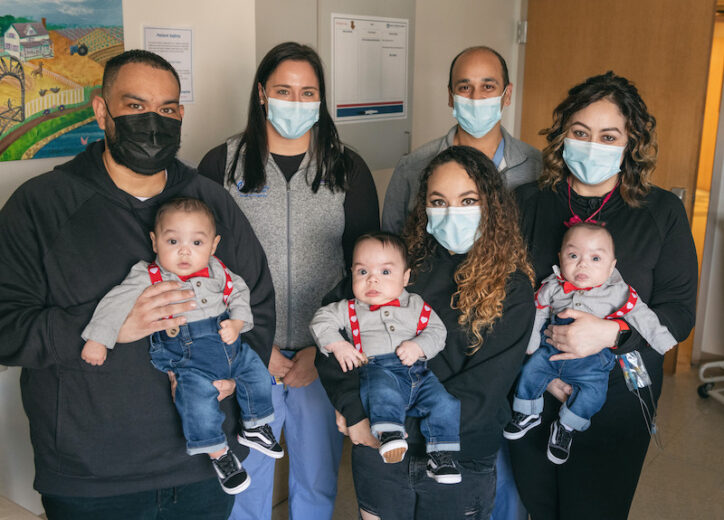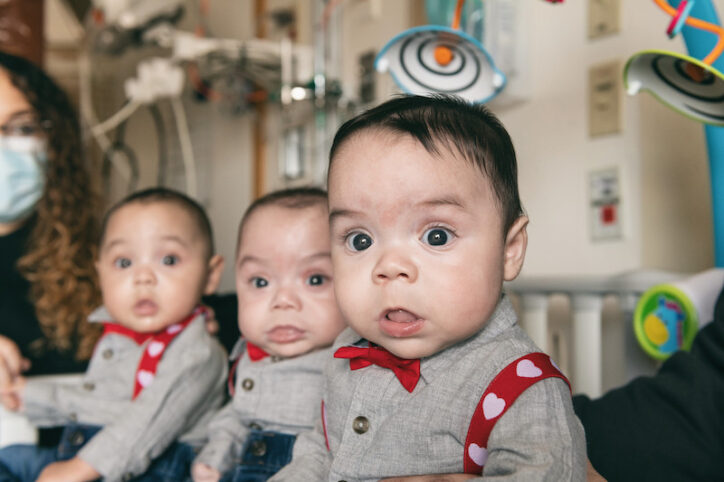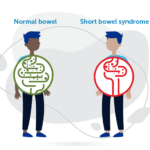Finding specialized care for short bowel syndrome: Meet Makai

Eric Maldonado was picking up some groceries one day last fall when he saw a familiar face: The woman, a nurse in his local hospital’s neonatal intensive care unit (NICU), had helped care for his son Makai earlier that year. “She asked how he was doing, because she remembered that he had been an angry baby,” says Eric. “I told her that now, he’s the happiest baby in the world.”
Indeed, Makai’s mood — and his health — has improved greatly since he was born last spring. One of a set of triplets, he developed necrotizing enterocolitis (NEC) soon after birth. NEC is a serious illness that results in the death of intestinal tissues in babies. This can lead to short bowel syndrome, a life-threatening condition in which the lack of functioning intestine can make it difficult to absorb the nutrients needed to survive and thrive. In Makai’s case, this meant a central line that would deliver nutrition to his body.
“It was such a dark time for us as a family,” says Eric.
A breath of fresh air
Although Makai’s initial treatment had taken place at the family’s home hospital in Connecticut, they felt he would receive more specialized care in the Center for Advanced Intestinal Rehabilitation (CAIR) at Boston Children’s Hospital. “Our daughter has chronic kidney disease and had been treated at Boston Children’s,” says Makai’s mom, Liz. “We were already familiar with Boston and wanted him to have that level of care too.”
A week before Makai was transferred to Boston, the Maldonados met some of the CAIR team, including the center’s surgical director, Dr. Biren Modi, and social worker Jessica McCaig, for a virtual visit. “They spent two hours talking with us and explaining everything — on a Saturday,” Liz marvels. “They didn’t just tell us what they were going to do; they listened to us and included us in those decisions. It was a breath of fresh air,” adds Eric.

Healthier — and happier
Relocating to another state — even temporarily — is difficult enough with one child. The Maldonados had to juggle work; their teenage daughter, Dyani; and Makai’s brothers, Gabriel and Eric, Jr., as they made plans to transfer his care to Boston. “We had no idea how we would be able to do it,” Liz admits. But they did, with the help of McCaig, who found the family temporary housing and provided other support as they navigated Makai’s care.
That care included taking the infant off of the painkiller fentanyl, which he had been receiving since his birth. “We were never comfortable with him being on this drug, but his previous doctors said he needed it,” says Liz. Yet within just a few days, the CAIR team had weaned him from it. The change in Makai’s demeanor was stunning. “He went from being grumpy and constantly sedated to being happy and engaged,” says Eric.

Making a tough time easier
Following treatment with Dr. Modi, Makai was able to return home to Connecticut — but not before his brother Gabriel required emergency surgery related to an inguinal hernia. “Dr. Carlos Estrada came in on his day off — also a Saturday — to perform the surgery,” remembers Liz. “And BCH was so accommodating; Gabriel got to share Makai’s hospital room while he recovered.”
Spending time with his brothers has been crucial for Makai, say his parents. The Maldonados have made it a priority for the boys to be together as much as possible, playing, listening to stories, or just hanging out. “We think one of the reasons he’s doing so well now is because he sees his brothers and wants to do the same things,” says Liz.
Makai still receives nutrition through his central line, a process managed by Dr. Alexandra Carey, director of the Home Parenteral Nutrition Program, and nutritionist Megan Gray. Through it all, he keeps smiling — even when he needs his dressings changed. And his parents are feeling optimistic, too. “This was the most challenging time in our lives,” says Eric. “To know that the team in Boston has our backs, that Makai’s care has never diminished, even when we returned home — that’s made everything a little bit easier.”
Learn more about the Center for Advanced Intestinal Rehabilitation.
Related Posts :
-

Doing everything possible for Gabby: A team approach to short bowel syndrome
Gabriel “Gabby” Lopez loves everything hot and spicy. “He will eat a ghost pepper without hesitation,” says his mother, Mayra. “...
-

Worth the fight: Finding care for short bowel syndrome
When Hannah Lillie meets someone new, she’s likely to smile and blow them a big kiss. The friendly, wide-eyed ...
-

A taste of childhood: One family’s journey to an IV-free diet
Children with short bowel syndrome often miss out on childhood’s simple and delicious pleasures, like birthday cake, ...
-

Living his best life: Caring for Christian
Christian Jaspersen was wet, muddy — and having the time of his life. After an ATV ride around his family’s ...





